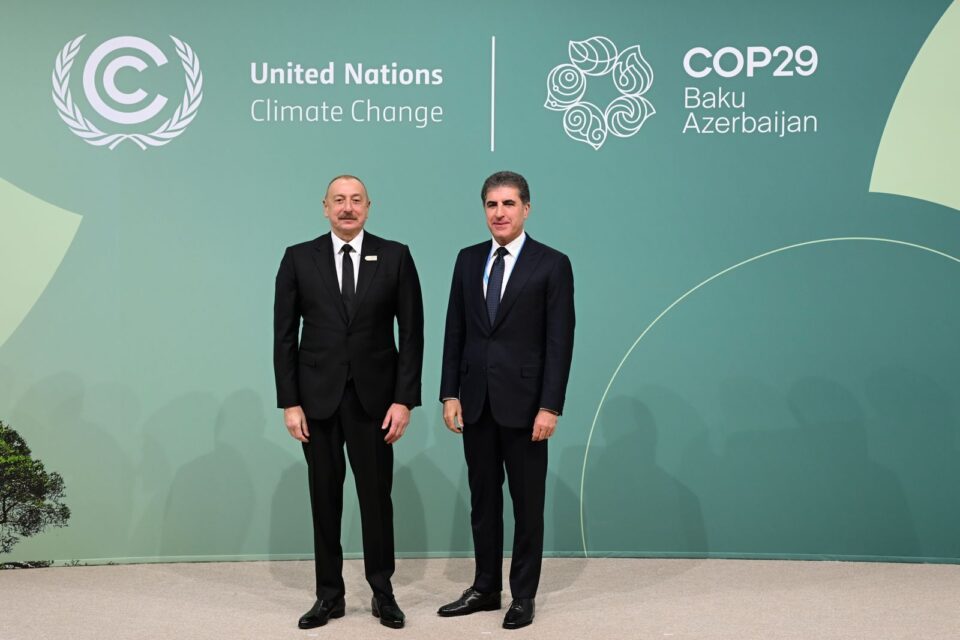Nechirvan Barzani outlines strategy to combat climate crisis in Iraq
Kurdistan Region President Nechirvan Barzani participated in the opening ceremony of the UN Climate Change Conference (COP29) in Baku, following an official invitation from Azerbaijani President Ilham Aliyev.
Arriving on Monday, Barzani engaged in diplomatic discussions with various heads of state during the conference, which focuses on developing strategies to combat climate change and its global challenges. The high-level summit, scheduled to continue until November 22, brings together world leaders to address pressing environmental concerns.
As part of the diplomatic proceedings, Kurdistan Region President attended a state dinner hosted by President Aliyev alongside other global leaders. Taking to social media platform X, the President of the Kurdistan Region expressed his appreciation to his Azerbaijani counterpart for the invitation and commended Azerbaijan’s government for their successful organization of the international conference and its associated programs.
Building Unity Through Environmental Cooperation: Nechirvan Barzani’s Vision for Iraq and Kurdistan
Kurdistan Region President has laid out an ambitious vision for tackling climate change in Iraq, emphasizing the urgent need for immediate action as the country ranks as the fifth most climate-vulnerable nation globally, according to recent UN reports.
Speaking at the Symposium on Climate Change and its Impacts on Iraq in May, Nechirvan Barzani highlighted the Kurdistan Region’s strategic importance in Iraq’s fight against climate change, particularly emphasizing its abundant water resources and favorable topography for water management infrastructure. Barzani’s address revealed that Iraq faces severe environmental challenges, with hundreds of square kilometers of agricultural land being lost to desertification annually.
The Kurdistan Region’s geographical advantages place it in a unique position to contribute to national climate resilience. Nechirvan Barzani specifically pointed to the region’s capacity for constructing “several dams and hundreds of ponds” that could significantly boost Iraq’s water storage capabilities. He praised the Kurdistan Regional Government’s recent successes in building multiple ponds across various areas, which have already demonstrated success in annual water collection.
Barzani’s vision extends beyond mere infrastructure development, calling for enhanced cooperation between the Federal Iraqi Government and the Kurdistan Regional Government. This collaboration is deemed essential for developing and implementing effective climate strategies, with particular emphasis on supporting the Kurdistan Region’s water management and reforestation initiatives.
Comprehensive Action Plan Emphasizes Education and International Cooperation
Nechirvan Barzani’s proposed strategy encompasses multiple dimensions, from institutional reform to public education and international cooperation. A key component of his vision involves establishing specialized institutions with enhanced powers and capabilities to address climate-related challenges effectively.
He has emphasized the critical role of education in fostering environmental awareness, calling for a fundamental shift in how environmental issues are addressed in educational programs. His proposal includes integrating comprehensive environmental education focusing on: water conservation practices, air pollution reduction strategies, energy consumption efficiency, and waste reduction methods.
The vision also advocates for a broader societal approach, suggesting the involvement of media outlets, cultural centers, and religious institutions in raising environmental awareness among individuals and families.
On the international front, Barzani has stressed the importance of Iraq’s water security, noting the country’s heavy dependence on neighboring nations for its river water supply. He has called for expanded coordination and cooperation with regional and global partners to address climate change challenges effectively.
The urgency of the situation is underscored by recent migration patterns, with the International Organization for Migration (IOM) reporting that approximately 130,000 people have been forced to leave their homes in southern Iraq in recent years due to climate-related issues. This displacement has contributed to various socio-economic challenges, including: weakened food security, increased unemployment and poverty, rising health problems, and escalating social security concerns.
Nechirvan Barzani’s address also highlighted recent positive developments in Iraq’s internal politics, suggesting that improved relations between Iraq and the Kurdistan Region could facilitate better cooperation on climate initiatives. He emphasized that long-term interests should take precedence over existing conflicts, calling for unity in addressing environmental challenges.
This comprehensive vision represents a significant step forward in Iraq’s approach to climate change, positioning the Kurdistan Region as a crucial partner in national climate adaptation efforts. The success of this strategy will largely depend on the effective implementation of proposed measures and the strength of cooperation between regional and federal authorities. As climate change continues to pose increasing threats to Iraq’s environment and society, the urgency of acting on these proposals becomes ever more critical.
By Jawad Qadir

